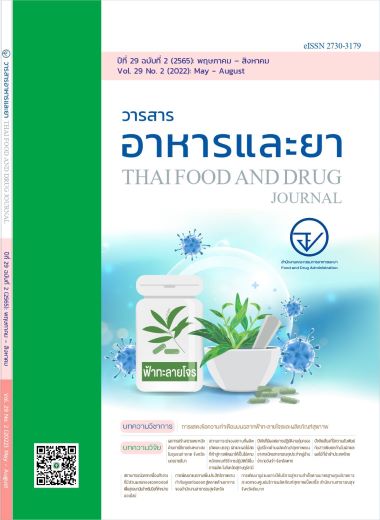การพัฒนาแนวทางเพิ่มประสิทธิภาพงานกำกับดูแลก่อนออกสู่ตลาดด้านอาหารของสำนักงานสาธารณสุขจังหวัด
Main Article Content
บทคัดย่อ
ความสำคัญ: การกำกับดูแลผลิตภัณฑ์อาหารก่อนออกสู่ตลาดทั่วประเทศไทยเป็นการยืนยันให้ผู้บริโภคได้รับความปลอดภัย คุ้มค่า สมประโยชน์ด้วยการตรวจประเมินสถานที่ และพิจารณาผลิตภัณฑ์อาหารให้เป็นไปตามกฎหมาย สำนักงานคณะกรรมการอาหารและยาได้มอบอำนาจการกำกับดูแลให้ส่วนภูมิภาคมาตั้งแต่ปี 2535 แต่ด้วยการปรับเปลี่ยนกฎหมาย ขั้นตอนและวิธีการปฏิบัติงาน ประกอบกับความก้าวหน้าของเทคโนโลยีการผลิตและการพัฒนาผลิตภัณฑ์ที่นำไปสู่นวัตกรรม มีความยุ่งยากซับซ้อนมากขึ้น ส่งผลให้ไม่สามารถดำเนินการที่เป็นทิศทางเดียวกันได้
วัตถุประสงค์: เพื่อศึกษาวิเคราะห์สถานการณ์ สภาพปัญหา และข้อจำกัดการดำเนินงานกำกับดูแลก่อนออกสู่ตลาดด้านอาหารของสำนักงานสาธารณสุขจังหวัด (สสจ.) และเพื่อจัดทำข้อเสนอแนวทางเพิ่มประสิทธิภาพงานกำกับดูแลก่อนออกสู่ตลาดด้านอาหารของ สสจ.
วิธีศึกษา: เป็นการศึกษาเชิงปริมาณและเชิงคุณภาพ โดยรวบรวมข้อมูลบุคลากร และประเด็นข้อหารือหรือคำถามของเจ้าหน้าที่ สสจ. และข้อมูลที่เกี่ยวข้องจาก พ.ร.บ. อาหาร ประกาศกระทรวงสาธารณสุข ระเบียบ อย. คำสั่ง อย. คู่มือประชาชน หลักเกณฑ์แนวทางการดำเนินงาน ระบบการดำเนินงานที่ใช้อยู่ในปัจจุบัน จากนั้นวิเคราะห์โดยใช้ผังก้างปลา
ผลการศึกษา:
จากการศึกษาสถานการณ์การพิจารณาคำขอผลิตภัณฑ์อาหารของ สสจ. ช่วงปีงบประมาณ พ.ศ. 2562-2564 พบมีปริมาณเพิ่มขึ้น ร้อยละ 21.83 (ปี 2563) และ 14.11 (ปี 2564) เมื่อเทียบกับปี 2562 พบปริมาณคำขออนุญาตมากที่สุดคือผลิตภัณฑ์อาหารที่มีความเสี่ยงต่ำ เช่น อาหารพร้อมปรุง อาหารสำเร็จรูปที่พร้อมบริโภคทันที น้ำบริโภค เป็นต้น ส่วนข้อหารือหรือคำถามของ สสจ. พบใช้ช่องทาง แอปพลิเคชัน Line มากที่สุด ร้อยละ 96.76 โดย 3 ลำดับแรกที่สอบถาม ได้แก่ การจัดประเภทอาหาร การพิจารณาชื่ออาหาร และแนวปฏิบัติและเอกสารที่ใช้ประกอบการขออนุญาตสถานที่และผลิตภัณฑ์อาหาร ร้อยละ 22.34, 18.52 และ 14.47 ตามลำดับ สำหรับสภาพปัญหาและข้อจำกัดที่พบ ได้แก่ (1) กฎหมายกฎระเบียบและการพิจารณาอนุญาตแตกต่างกัน โดย สสจ. ได้รับมอบอำนาจผลิตภัณฑ์อาหารควบคุมเฉพาะกรณีวัตถุเจือปนอาหารที่ผลิตโดยแบ่งบรรจุจากผลิตภัณฑ์ที่มีเลขสารบบอาหารแล้ว อาหารที่กำหนดคุณภาพมาตรฐานบางประเภท และอาหารที่ต้องมีฉลาก รวมทั้งสถานที่นำเข้า สถานที่เก็บ สถานที่ผลิตอาหาร และการโฆษณาที่ตั้งอยู่ในเขตจังหวัดนั้น ๆ ยกเว้นสื่อโทรทัศน์ (2) ผู้ปฏิบัติงานในส่วนภูมิภาคเป็นเภสัชกร ร้อยละ 81.76 รองลงมาเป็นนักวิชาการสาธารณสุข และอื่น ๆ ร้อยละ 10.38 และ 7.86 ไม่มีนักวิชาการอาหารและยา ขณะที่ อย. เป็นนักวิชาการอาหารและยา เภสัชกร และอื่น ๆ ร้อยละ 92.11, 5.29 และ 2.63 ตามลำดับ นอกจากนั้น พบว่า ผู้ปฏิบัติงานของ สสจ. มีภารกิจหลักหลายด้านเช่น พ.ร.บ. ยา ซึ่งมากกว่าผู้ปฏิบัติงานของกองอาหาร อย. ที่มีเฉพาะ พ.ร.บ. อาหารเท่านั้น (3) วิธีการปฏิบัติงานบางกระบวนการของ สสจ. ไม่เป็นระบบการยื่นคำขอแบบอิเล็กทรอนิกส์ สำหรับข้อเสนอแนวทางเพิ่มประสิทธิภาพงานของ สสจ. มี 4 แนวทาง ได้แก่ การปรับปรุงแก้ไขประกาศกระทรวงสาธารณสุขให้มีข้อกำหนดคุณภาพมาตรฐานตามประเภทของอาหาร (protocol) การปรับปรุงและพัฒนากระบวนการพิจารณาอนุญาต (process) การมอบอำนาจให้ สสจ. ตามความเสี่ยงและความซับซ้อนของการพิจารณาอนุญาต (power) และการพัฒนาความรู้ของเจ้าหน้าที่ผู้ปฏิบัติงาน (people)
สรุป: คำขอผลิตภัณฑ์อาหารของ สสจ. มีแนวโน้มเพิ่มขึ้น สภาพปัญหาและข้อจำกัดสำคัญมี 3 ด้าน ได้แก่ (1) กฎหมายกฎระเบียบและการพิจารณาอนุญาตตามระดับความเสี่ยงอาหารมีความแตกต่างกัน (2) คุณสมบัติและภาระงานของบุคลากรผู้ปฏิบัติงานระหว่าง สสจ. และกองอาหาร อย. มีความแตกต่างกัน (3) ระบบการยื่นคำขอบางกระบวนการไม่เป็นอิเล็กทรอนิกส์ทั้งหมด
Article Details

อนุญาตภายใต้เงื่อนไข Creative Commons Attribution 4.0 International License.
เอกสารอ้างอิง
พระราชบัญัญติอาหาร พ.ศ.2522. ราชกิจจานุเบกษา ฉบับพิเศษ เล่มที่ 96, ตอนที่ 79 (ลงวันที่ 13 พฤษภาคม 2522).
สำนักงานคณะกรรมการอาหารและยา. ระเบียบสำนักงานคณะกรรมการอาหารและยาว่าด้วยการดำเนินการเกี่ยวกับเลขสารบบอาหาร พ.ศ. 2562. ราชกิจจานุเบกษา เล่มที่ 136, ตอนพิเศษ 243 ง (ลงวันที่ 30 กันยายน 2562).
สุภัทรา บุญเสริม, จารุณี อินทรสุข. การวิเคราะห์และพัฒนาแนวทางการจัดประเภทอาหารให้สอดคล้องกับหลักการและมาตรฐานสากล. วารสารอาหารและยา [อินเทอร์เน็ต]. 2563 [เข้าถึงเมื่อ 20 ธ.ค. 2564];
(1):13-26. เข้าถึงได้จาก: https://he01.tci-thaijo.org/index.php/fdajournal/article/view/240386/163687
กระทรวงสาธารณสุข. กฎกระทรวงแบ่งส่วนราชการสำนักงานคณะกรรมการอาหารและยา กระทรวงสาธารณสุข
พ.ศ.2563 .ราชกิจจานนุเบกษา เล่มที่ 137, ตอนที่ 8 (ลงวันที่ 29 มกราคม 2563).
สำนักงานคณะกรรมการอาหารและยา. คำสั่งสำนักงานคณะกรรมการอาหารและยา ที่ 495/2555 เรื่อง มอบอำนาจเลขาธิการคณะกรรมการอาหารและยา ตามกฎหมายว่าด้วยอาหารให้ผู้ว่าราชการจังหวัดและนายแพทย์สาธารณสุขจังหวัด (ลงวันที่ 12 ธันวาคม 2555).
สำนักงานคณะกรรมการอาหารและยา. คำสั่งสำนักงานคณะกรรมการอาหารและยา ที่ 86/57 เรื่อง มอบอำนาจเลขาธิการคณะกรรมการอาหารและยา ตามกฎหมายว่าด้วยอาหารให้ผู้ว่าราชการจังหวัดและนายแพทย์สาธารณสุขจังหวัด (ฉบับที่ 2) (ลงวันที่ 5 มีนาคม2557).
สำนักงานคณะกรรมการอาหารและยา. คำสั่งสำนักงานคณะกรรมการอาหารและยา ที่ 22/2559 เรื่อง มอบอำนาจเลขาธิการคณะกรรมการอาหารและยา ตามกฎหมายว่าด้วยอาหารให้ผู้ว่าราชการจังหวัดและนายแพทย์สาธารณสุขจังหวัด (ฉบับที่ 3) (ลงวันที่ 18 มกราคม 2559).
สำนักงานคณะกรรมการอาหารและยา. คำสั่งสำนักงานคณะกรรมการอาหารและยา ที่ 336/2557 เรื่อง การมอบหมายของเลขาธิการคณะกรรมการอาหารและยา ตามกฎหมายเฉพาะ (ลงวันที่ 3 ตุลาคม 2557).
กระทรวงสาธารณสุข. ประกาศกระทรวงสาธารณสุข (ฉบับที่ 195) พ.ศ. 2543 เรื่อง เครื่องดื่มเกลือแร่. ราชกิจจานุเบกษา เล่มที่ 118, ตอนพิเศษ 6 ง (ลงวันที่ 24 มกราคม 2544).
กระทรวงสาธารณสุข. ประกาศกระทรวงสาธารณสุข (ฉบับที่ 197) พ.ศ. 2543 เรื่อง กาแฟ. ราชกิจจานุเบกษา เล่ม 118 ตอนพิเศษ 6 ง (ลงวันที่ 24 มกราคม 2544).
กระทรวงสาธารณสุข. ประกาศกระทรวงสาธารณสุข (ฉบับที่ 356) พ.ศ. 2556 เรื่อง เครื่องดื่มในภาชนะบรรจุที่ปิดสนิท. ราชกิจจานุเบกษา เล่มที่ 130, ตอนพิเศษ 87 (ลงวันที่ 24 กรกฎาคม 2556).
FAO and WHO. Food categories - updated up to the 42nd session of the codex alimentarius commission 2019 [Internet]. FAO and WHO; 2019 [cited 2020 Dec 20]. Available from: http:// www.fao.org/gsfaonline/foods/index.html
กระทรวงสาธารณสุข. ประกาศกระทรวงสาธารณสุข (ฉบับที่ 427) พ.ศ. 2564 ออกตามความใน พ.ร.บ.อาหาร พ.ศ. 2522 เรื่อง ผลิตภัณฑ์อาหารที่มีส่วนประกอบของส่วนของกัญชาหรือกัญชง. ราชกิจจานุเบกษา เล่ม 138, ตอนพิเศษ 168 (ลงวันที่ 23 กรกฎาคม 2564).


